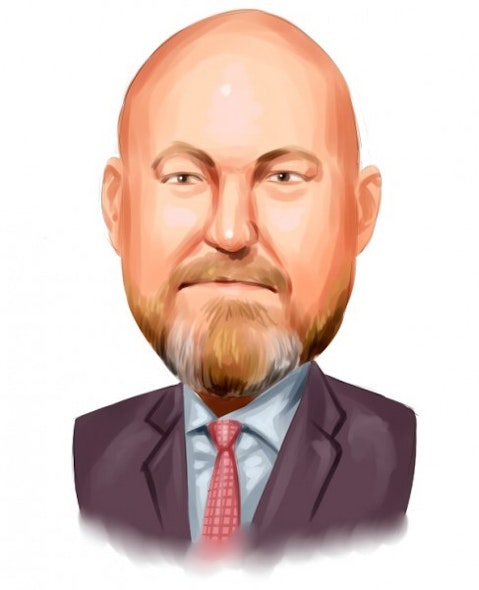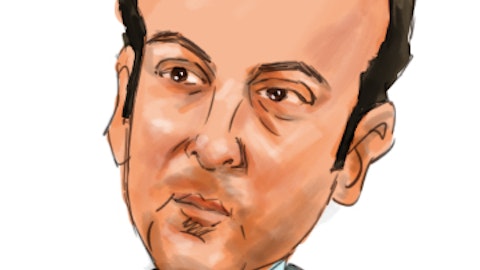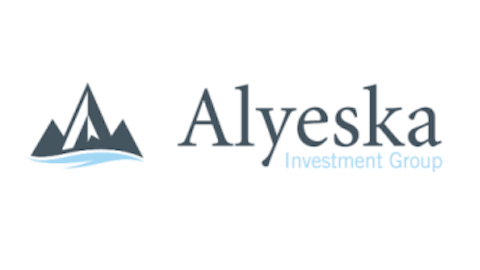The aftermarket parts and replacement parts industry has seen a string of positive growth from the DIY (do-it-yourself) market. The industry is being propelled by an increasing average age of vehicles and an uptick in the average number of miles driven. The high number of total light trucks and SUVs in operation is also positive for the companies in the DIY and parts market, as light trucks lend themselves to higher aftermarket product purchases, versus cars. The S&P Automotive Retail Index is up 6.1% versus a 12.0% gain for the S&P 1500 Index year to date through August.
We have identified the top five companies in the auto parts and accessories industry, and find that key fund managers also see positive aspects of this marketplace.
AutoZone, Inc. (NYSE:AZO) reported its latest quarterly results that came in at $8.46 EPS, versus $7.18 the same quarter last year, and beat analyst estimates of $8.41. AutoZone also managed to expand margins, with gross margins expanding to 51.8% from 51.2%. However, domestic same store sales only rose 2.1%, compared to 4.5% last year—namely due to slower than expected sales in three of their ten districts.
The company hopes to differentiate itself from other parts retailers by reformatting its hub stores. This will provide AutoZone with more retail selling space and a greater assortment of merchandise. The company has already started consolidating several hubs and is seeing significantly greater sales from these stores given improved product assortment and availability. See our detailed analysis of AutoZone here.
AutoZone saw Eddie Lampert of ESL Investments take a new position in the company last quarter, while Stephen Mandel of Lone Pine Capital remained the top fund by shares invested. Additionally, AutoZone has seen a robust round of insider sales lately.
The Pep Boys (NYSE:PBY), following a takeover bid that sent the stock trading over $15 per share—versus current levels of $10 per share—saw a high lever of interest from fund managers. During the second quarter, AQR Capital Management, the top firm by shares of those we track, increased their 1Q stake 203% to own 1.2 million shares. Cannell Capital also increased their 1Q stake over 200%, and Farallon Capital and Glenhill Advisors took new positions of around 1 million each.
The company reported strong 2Q numbers, posting EPS of $0.33, versus $0.26 from 2Q 2011, and consensus of $0.16, with part of this beat being attributed to the merger-termination fee from the break up of a potential acquisition by The Gores Group. The Gores Group announced an agreement to purchase Pep Boys at $15 per share, but backed out in May, paying the company $43 million as a break up fee. Next year EPS growth is expected to grow by 37% on the back of the company’s do-it-for-me service-related business.
O’Reilly Automotive Inc (NASDAQ:ORLY) recently saw its 2012 and 2013 EPS estimates revised upward—to $4.64 and $5.37 from $4.62 and $5.32. 2Q sales rose 5.6%, including a 2.5% increase in comp-store sales. Despite sales challenges, gross margins widened 1.3 percentage points, which we attribute to continued supply chain improvements.
Select Equity Group was by far the largest fund shareholder with 2.7 million shares at the end of 2Q, which was a 23% increase. Also increasing their stakes were D.E. Shaw and Akre Capital Management, by 15% and 50% respectively.
LKQ Corporation (NASDAQ:LKQ), much like Pep Boys, has a relatively small market cap, but reported second quarter revenue of $1 billion, an increase of 32.5% from the $760 million it reported in Q2 of 2011. EPS of $0.43 increased 34% from $0.32 a share one year earlier.
Chilton Investment Company owns over 3 million shares and is LKQ’s top bull. Tiger Consumer Management was another large shareholder with over 1 million shares. Two other big names that had modest stakes were Jim Simons and D.E. Shaw.
Advance Auto Parts, Inc. (NYSE:AAP) missed 2Q 2012 expectations as comp sales declined. The company reported net income of $99.6 million or $1.34 per share, down from $113.1 million or $1.46 per diluted share in the same quarter last year, falling short of the consensus EPS forecast of $1.39. Second quarter sales fell 1.3% year over year, reflecting a 2.7% decline in comp sales. This is down from comp growth of 2.5% in 2Q 2011 and below the recent historical average of 8% growth.
Advance recently saw its 2013 EPS estimates cut to $6.11 from $6.57 based on relatively flat gross margins and higher supply-chain costs, in addition to costs related to new store openings. Management also lowered its 2012 comp-store sales forecast for the second straight quarter, and expects flat to slightly negative growth for the year.
Advance saw three new investors take new positions that were top five share owners amongst funds we track, with Richard Blum of Blum Capital increasing his stake by 23%.
Overall, Pep Boys is fairly cheap on a valuation basis, but is also on the small side in terms of market cap. The company trades at a P/E of 15 and a P/S of 0.3. Advance also trades below its other peers, sporting a P/E of 13 and P/E of 0.8. The other companies come in with P/E ratios as follows: LKQ 22x, O’Reilly 19x, and AutoZone 17x. Likewise, P/S ratios are again well above those of Pep Boys and Advance: LKQ 1.7x, O’Reilly 1.7x, and AutoZone 1.7x. Pep Boys, which is coming off a buyout bid, now trades below its pre-offer bid. Both Pep Boys and Advance are the only two companies of the five that are down year to date, at -11.5% and -1.7%, respectively. They may represent good value-plays going forward.






